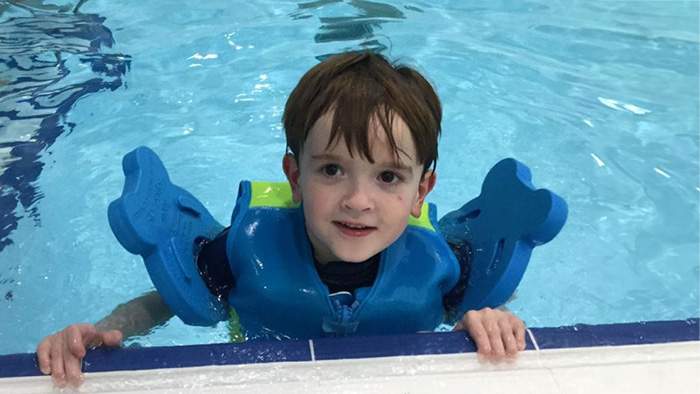Swimming
Drowning is the third most common cause of accidental death in children, and therefore, it is absolutely vital that every child has the opportunity to learn to swim and gain core knowledge regarding water safety. Even if your child can swim, they may still be exposed to danger in water in the wrong circumstances. Your child should be encouraged to practise their swimming regularly to improve their basic skills and become a more competent swimmer.

Swimming and water safety is a statutory element of the PE National Curriculum. This means:
All schools must provide swimming instruction either in Key Stage 1 or Key Stage 2. In particular, pupils should be taught to swim competently, confidently and proficiently over a distance of at least 25 metres, use a range of strokes effectively, such as front crawl, backstroke and breaststroke, and perform safe self-rescue in different water-based situations.
Every child who attends our primary school at Daventry Hill School is offered water confidence and swimming lessons.
Our School Swimming Data
Due to the Covid-19 pandemic, we have not been able to offer a comprehensive programme of swimming during the 2020/21 academic year and therefore are unable to provide relevant data. Please see below for the previous academic year data.
Below are the numbers and percentages of our Year 6 pupils (2019-20) who can:
| Skill | Number of Pupils | % of Cohort |
| Swim competently, confidently and proficiently over a distance of at least 25 metres | 10 | 100 |
| Use a range of strokes effectively (for example, front crawl, backstroke and breaststroke) | 5 | 50 |
| Perform safe self rescue in different water-based situations | 8 | 80 |
Parents' Role In Swimming - What You Can Do To Help
As a parent, guardian or carer, you play an absolutely vital role in encouraging your child to swim and learn about water safety, survival and lifesaving. There are several ways you can help your child:
Swimming lessons at school
- Make sure your child has everything they need to participate in their school swimming sessions.
- Don’t just rely on school swimming lessons – sign your child up for additional lessons at a local facility as soon as possible – they can start to learn as a baby.
Swimming as a family
- Visit a pool regularly to add to your child’s swimming experience.
- Go swimming as a family or with a group of friends to ensure that swimming is a fun, enjoyable and social activity
- There are lots of games you can play with your child to boost their water confidence – there are some listed below.
- Are you a proficient swimmer yourself? If not, set an example for your child and learn to swim – It’s never too late to learn, it’s a fantastic experience, and not as daunting as you might think!
- Once you can swim, a whole world of other activities open up for you – and your child will be impressed at how much you can join in with!
Celebrate swimming successes
- Take an active interest in your child’s progress in learning to swim and encourage them to do their best during lessons.
- Recognise and celebrate their successes at home – and don’t forget the small steps are just as important as the larger milestones.
Just keep swimming
- Once your child has learnt to swim, don’t stop there. It’s really important to continue with their regular lessons, to take them beyond the ability to swim a length and ensure that they have the skills to save themselves if an unexpected incident should occur.
- They could move on to joining a local swimming club and develop their skills further. They could also take part in other aquatic activities such as diving, lifesaving, synchronised swimming or water polo.
- Being able to swim also means they will be able to take part in more adventurous water-based pursuits such as sailing, canoeing and surfing.
